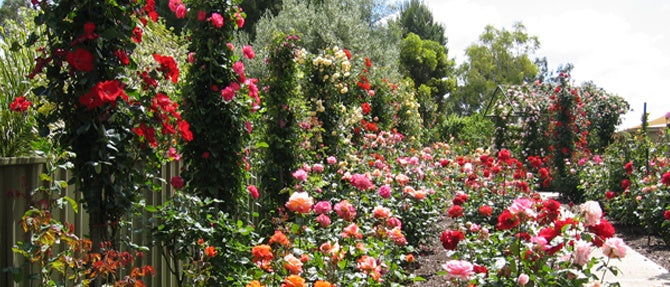The rose has a timeless beauty and is an irresistible attraction to many people. Roses are often regarded as the queen of flowering shrubs and their flowers bring a touch of romance to any garden. Roses are a favourite of Palmers customers, and we often get questions about them on our Palmers Gardening Forum. Here are the most frequently asked roses questions:
What is the best way to prune a rose?
Winter is the time to plant new roses, prune roses in the garden and to spray them to keep pest and disease problems down for summer. The words “rose pruning” seems to strike fear into some gardeners. But realistically it is a very easy exercise. Pruning is an important part of rose growing as it helps to maintain vigour and produce the maximum number of flowers.
Remove all weak, dead or diseased growth off the rose. Reduce the height of the rose and form an open centre by pruning any wood that is crossing through the centre of the plant. This will allow air movement and help keep disease problems down. Always trim to just above a strong bud on the rose on a slight angle away from the bud. Never prune too far above the bud as this can cause dieback of the stem which, if left unchecked, may lead to failure of the plant. Prune to outward facing buds and prune to shape the plant.
Climbing and rambling roses must be trained from the time of planting. For the first two years climbing and rambling roses need little pruning. This will form the framework for future growth and flowering. Remove any weak, dead or diseased wood. Cut side growths or laterals back to within a couple of buds from the main cones. This is where future growth and flowering will come from.
Spray your roses with copper and a winter spraying oil at the time of pruning and again one month after. You can mix the two sprays together in the one sprayer. A good tip is to spray the plant, the base of the plant and the ground around the plant. This will help to kill any over wintering eggs or diseases.
If you’re ever unsure about rose pruning or care, pop in store and talk to us.
What companion plants can I plant with my roses?
Roses are healthier when provided with companion plants which help repel destructive bugs while encouraging beneficial insects. Good rose companions should enjoy the same growing conditions but not compete too aggressively with the roses. Roses do best in full sun and well-drained soil, and so should their companions. Plants that are too aggressive may crowd the roses and absorb too much water and nutrients from the soil.
Good rose companions are those that hide their bare legs. Traditionally, lavender, violets, dianthus, geraniums, lilies, herbs and other aromatic plants make wonderful rose companions. Good companions also act as living mulches—suppressing weeds and lightly shading the soil, keeping their roots nice and cool.
When is the best time to move roses in the garden?
Roses can be prone to transplant shock so the best time to relocate them would be after pruning in July when the rose is dormant with no active growth. When it comes time to transplant the rose, make sure that the risk of frosts (or freezing weather) has passed and dig in plenty of compost to your roses’ new home. Make sure the new hole is large enough to accommodate the roses’ roots comfortably and be sure to give it a good water.
We recommend picking an overcast day to move any shrubs and trees around the garden.
Why aren’t my roses flowering?
It could be a number of reasons. Make sure that you continue regular, deep watering of the plant and apply a good quality rose fertiliser monthly.
What kind of diseases/ fungus can roses get?
Blackspot
A fungal disease spread by high humidity and rain drops. Currently you will need to spray with Free flow copper (the finest particle copper available, for the best results). Black spot can’t be cured you can prevent it from getting established/spreading with the Copper.
A good winter clean up spray (copper/oil/lime sulphur) will help for next year) – mix in some organic seaweed/compost tea or fish fertiliser to keep the rose healthy with shiny foliage.
Rust
After you prune the rose, ensure all leaves are cleaned up from around the rose bush. Then spray Grosafe Free Flow Copper on both the rose and the surrounding area, followed by a spray of Grosafe Enspray 99 Oil about a week later (also on the plant and surrounding area). As the rose starts to regrow, spray with Grosafe Fungus Fighter every 2-3 weeks.
As rust is a fungus it is only controllable by preventative sprays like Fungus Fighter, once the plant has rust you can only stop it from spreading. Instead of using rose fertiliser, try using Biogro Certified Organic fertiliser, this provides a healthier soil environment resulting in a healthier rose (all of our stores have 3 different types; Fish, Compost, Seaweed, and all perform a similar role).
The copper and oil sprays are ‘clean up’ winter sprays, helping get rid of all the insects and diseases that have accumulated over winter. They are also very good sprays for your citrus to keep insect and fungus at bay throughout the year. All of the above sprays are BioGro Certified, so can be sprayed with confidence that you are not spraying with chemicals.
What fertilisers and sprays should I be using?
Free flow copper and Enspray oil this will kill any insect and fungal disease. Use a slow release fertiliser to generate new growth. Spray on organic seaweed fertiliser, this will help the overall health of the plant and prevent insect and disease.

